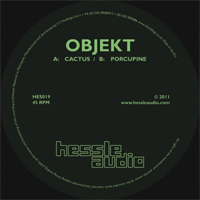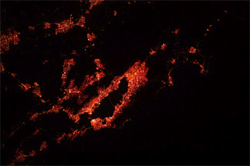With last year arguably carving the divisions within dubstep so deep as to break slabs off entirely, it feels appropriate to open 2012 by thinking about the future of the morass that’s opened up in the wake of that genre’s dissolution. I wrote a year ago about how woefully inadequate terms like ‘post-dubstep’ and ‘future-garage’ felt at describing the melee of different forms that were emerging back then. Now it’s possible to add another to that list – ‘bass music’ – which, rather than being overly reductive like the other two, is if anything too vague, potentially referring to anything from "some massive Sub Focus big room monster d’n’b tune, [to] some little Roska rolling thing" (Tectonic label head Pinch’s words).
Over the past twelve months, certain pathways have more firmly crystallised within the space that’s arrived after dubstep, with many ostensibly similar artists revealing increasingly different directions as tempos have slowed. Looking backward now, what’s striking is that many of those divisions were apparent all along – but, shaded under the umbrella of 140bpm, were nigh-on invisible until they began to escape that comfort zone. So Brackles, for example, sits in the company of Rinse and Hyperdub affiliated ‘funky’ type artists like DVA, Cooly G and Funkystepz, while the Hessle Audio crew and a few affiliates have shifted further towards percussive Chicago-influenced jack tracks. Many Bristol producers are drawing for US deep house of the Underground Quality/FXHE variety, raw, unpolished and fascinated with the possibilities of analogue gear.
In fact, what marks out all the artists I’ve chosen to include in this month’s column is their lack of affiliation to any particular genre. Dubstep might be the obvious single element with which to link them – after all, they all began their production/releasing careers in that space, and have drawn a great deal of influence from it – but the use of ‘post-dubstep’ simply fails to capture the breadth of the spaces in which each operate. Berlin resident Objekt, for example, could just as easily be described as ‘post-techno’: that tag would simultaneously be just as accurate, and just as unable to convey the complexities of his music.
Such has always been the problem with genre labelling. But, if anything, the current state of affairs calls for new ways of thinking about UK dance music. The post-dubstep ‘holding pattern’ identified by several commentators a year ago remains in place – just. But it’s fading fast, and as the trajectory of its descendants moves ever further from the point of origin it’s becoming increasingly necessary to rethink the way we connect these new musics to their predecessors. As the dancefloors that dubstep’s offspring have shared continue to diverge, so too do the paths of the music that occupy them. This year promises exciting things.
Objekt – Cactus/Porcupine [Hessle Audio]

The label’s latest missive, from Berlin resident TJ Hertz (aka Objekt), is a case in point. That they’ve chosen to release one of their most challenging 12"s to date (up there with Elgato’s masterful, rain-soaked ‘Blue’) immediately after their most successful year so far feels like a joyous fuck you, and stands as testament to their lack of interest in pandering to what listeners might expect. Sure, Hertz’s music does fit neatly into Hessle’s bone-dry, sparse and heavily percussion-focused aesthetic: he’s been making regular DJ appearances at their events for about a year now, and it felt only a matter of time before some of his tracks emerged through the label. But beyond surface similarities it’s deeply idiosyncratic, rhythmically tricky – A-side ‘Cactus’ is an absolute bitch to mix – and far more in thrall to Objekt’s home city than the majority of his labelmates. It’s also beautifully produced. Hertz apparently works for a music software company, and it shows in his music’s unusual depth of field, careful attention to textural detail and virulent, thrashy force.
‘Cactus’, for example, feels primed to snap and scatter dancers as though they were no heavier than ragdolls. In tone and structure it’s probably closest to the broken techno of Rene Pawlowitz in his Shed guise – the miniscule wisps of synth melody that hang far in the distance almost entirely out of earshot, for example, are reminiscent of some of the more downbeat moments of Shed’s Shedding The Past album. But, in keeping with the Hessle association and the dubstep flex of Hertz’s debut 12" last year, the UK is deeply rooted in its DNA, present in its off-kilter syncopations, back-breaking snare cracks and grimey-as-fuck low end. In both sound and effect, it’s as if Hertz is force-feeding Shed’s skinny frame such a rich diet of early Wiley instrumentals that it can no longer contain the pressure of its own innards. Halfway through it simply bursts, sending gooey foie gras spilling out across the dancefloor.
B-side ‘Porcupine’ (sensing a trend here?) has a similarly ‘Berlin’ atmosphere. The flickering chords which whip across its length, for example, are pure Basic Channel-lineage dub techno. But again, the way it’s shaped differs from any other producer attempting to unite that city’s techno sounds with London-borne bass lineages. It’s unusually violent, jarring and bristly, possessed of chest-rattling sub-bass that regularly plunges through the floor and a tough broken rhythm. Halfway through, metronomic hi-hats peak for a moment, offering concession to warehouse techno heads, but this is deeply individual and very distinctive music. They might not sound very much alike, but only sometime labelmate Peverelist is currently matching Hertz’s ability to process the stuff of established genres into such thrillingly unfamiliar shapes.
Peverelist – Sonic Router Mix #114 [free download]

There’s a real wealth of his own new productions too, which is always the most exciting thing about a new Peverelist mix. The pace might have dropped to mid 120s, but the rolling inevitability that’s always marked his music as jungle-inspired is still present, as are his distinctive percussive tics and loping synth drones. ‘End Point’ in particular is jawdropping, its vaguely two-steppy feel driven by seemingly innumerable tiny percussive elements all operating tightly in tandem – a virtuosic display of rhythm science paired with lovely, drizzly curtains of synth. With the mix featuring New York hero Levon Vincent, there’s the sense here of a circle being closed, of the Bristolian house/techno sound slotting into a longer and deeper continuum that stretches further afield than UK rave history. It might remain halfstepped and initially challenging for a crowd raised on four-to-the-floor, but the composition, cleverness and composure here are top notch, and highlight exciting routes through the future of the space that’s opened up post dubstep.
Spam Chop – Cuckup EP [Mimm]

But it’s the way these tracks develop, and their sultry way with melody, that’s such a joy. Rather than simply set up a groove and stick with it, Spam Chop’s tunes regularly change tack two or three times in quick succession: witness how ‘Cuckup’ melts away into a tangled mess of wind chimes before slyly creeping back up to full pace, for example. EP highlight ‘Blergzz’ pulls off an even meatier shift, beginning life as Blunted Robots-style metallic garage before escalating, halfway through, into a thick, muscular house groove. But even then it refuses to sit still, itchily shifting angle of attack every eight bars (an approach that subtly betrays the influence of grime), and beset at every turn by lovely, fleeting music box melodies.
LHF – EP3: Cities Of Technology [Keysound]

But like last time, Double Helix’s contributions mark the EP’s highlights, and take up the entire A-side. Hovering around dubstep’s 140bpm mark point, both his tracks have a certain stealthy, smoke-and-mirrors feel, suggesting that all’s not quite as it seems – a sensation heightened by their start-stop motion and svelte, snakelike percussive runs. Opener ‘Supreme Architecture’ audibly references jungle and drum ‘n’ bass more than any dubstep-tempo track I’ve heard for a while, working those genres’ fondness for post-societal sci-fi mythology (it opens on a long monologue from one of the Matrix sequels) and the wordless screams of tortured rave divas into a beautiful wasteland of a track. Paired with the brooding radio ghosts of ‘LDN’, it brings to mind images of the capital in some war-scorched far-future, heaps of crumbling brickwork and twisted metal skyscrapers slumped uneasily alongside faded posters for some long-since-finished West End musical run.
[Also finally seeing release on vinyl through Keysound this month is Kowton & Dusk’s excellent split EP, which I reviewed a few columns back, and said "evokes nocturnal images of half-abandoned urban spaces, industrial parks and A-roads". In entirely a good way, obviously. The full review’s here.]
A Made Up Sound – Take The Plunge [AMUS]




